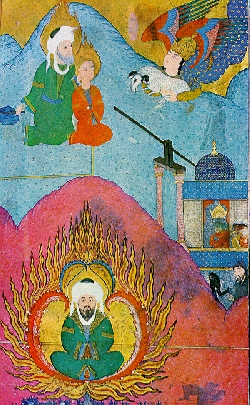In the vast panorama of religious narratives, the figure of Abraham holds a paramount position. Referred to as the patriarch in Judaism, Christianity, and Islam, his story transcends ethnic and cultural boundaries, providing a rich tapestry of theological reflections. Within the Bahá’í Faith, Abraham is recognized not only as a prophet but also as a pivotal symbol of the transformative journey from polytheism to monotheism. This exploration, particularly through the lens of Abraham as “The Idol Smasher,” invites a deeper understanding of the theological implications and promises an intriguing shift in perspective regarding faith, devotion, and the human experience.
At the core of Bahá’í teachings lies the understanding of progressive revelation, where God reveals His will and guidance through various prophets throughout history. Abraham’s role is seminal in this paradigm, marking a significant departure from idol worship and the embrace of a singular divine essence. His encounter with idolatry, characterized by the smashing of idols, serves as a potent metaphor for the rejection of false beliefs and the erroneous constructs that often ensnare humanity. The act of destroying these idols is not merely a physical act but a profound spiritual statement about the necessity of purging one’s heart and mind of all that diverts attention from the divine source.
The story of Abraham, particularly his confrontation with the polytheistic beliefs prevalent in his society, raises pertinent questions about human understanding of divinity. Abraham’s declaration, “I have turned my face towards Him Who created the heavens and the earth,” encapsulates a pivotal moment in the quest for truth. This pronouncement is not merely an assertion of belief; it is an invitation to consider the depths of monotheism. Bahá’í teachings emphasize that such moments of clarity are accessible to all individuals, prompting an evolutionary leap in consciousness that can lead to a more profound connection with the divine.
Moreover, the Bahá’í perspective on Abraham as “The Idol Smasher” broadens the narrative beyond historical accounts. It serves as an allegory for internal struggles that individuals face when confronting their own idols—be it materialism, dogma, or cultural hegemony. In a contemporary context, the idols may take on new forms, demanding from individuals and communities alike a vigilant examination of values and beliefs. The smashing of these idols can be seen as a prerequisite for spiritual growth, urging adherents to transcend superficial affiliations and to delve into the essence of faith itself.
The promise of this transformative journey is profound. Through the example of Abraham, Bahá’í teachings encourage believers to embark upon a personal odyssey, fostering a critical consciousness that resonates with the pursuit of truth. This exploration is dynamic, inviting an engagement with the divine that is both personal and communal. The Bahá’í community, as a diverse tapestry of beliefs and practices, embodies the principles of kinship underscored by Abraham’s legacy, which advocates for unity in diversity and shared values that transcend individual narratives.
Another crucial aspect of Abraham’s narrative within the Bahá’í Faith emphasizes his unwavering faith in God amidst trials. The story of his willingness to sacrifice his son, often interpreted through varying religious lenses, illuminates the depths of faith required in the face of uncertainty. In the Bahá’í context, this episode stands as an inspiring testament to the resilience of belief and the importance of submission to the divine will. The willingness to relinquish personal desires in favor of a higher purpose is presented as an ideal for believers, signifying a path that leads to enlightenment and spiritual fulfillment.
This character strength is not merely historical but resonates within today’s spiritual seekers. The ability to confront personal trials, much like Abraham did, can lead to profound growth and understanding. In a world increasingly characterized by turbulence and strife, the narrative of The Idol Smasher becomes an emblem of hope and a blueprint for modern believers. Each individual is challenged to identify their own idols and engage in acts of spiritual courage that can inspire communal transformation.
Furthermore, the implications of Abraham’s legacy extend into the realm of social justice and ethical living. The rejection of idolatry is intricately connected to the pursuit of justice—wherein true adherence to one God includes the obligation to foster equity, eradicate prejudice, and uphold the dignity of all humanity. The Bahá’í teachings advocate that faith should manifest itself in action, promoting positive social change that reflects the unity espoused by Abraham’s monotheistic ideals. Through the lens of social ethics, Abraham’s story exemplifies the transformative power of belief when coupled with responsible action—a theme that resonates deeply within the Bahá’í community and beyond.
In conclusion, the figure of Abraham as “The Idol Smasher” invites a comprehensive re-evaluation of ideologies and practices that govern human behavior. Bahá’í teachings position this narrative not just as a historical account but as an enduring metaphor for spiritual awakening, individual responsibility, and collective harmony. The stories of Abraham resonate today, encouraging believers to engage deeply with their faith while dismantling the idols that obscure the path to understanding the divine. The promise of transformation is not a static ideal but a dynamic journey towards discovering the true essence of spirituality. Thus, the legacy of Abraham inspires a deliberate shift in perspective, urging all to consider the idols they hold and to embark upon a quest towards spiritual authenticity and profound unity.
